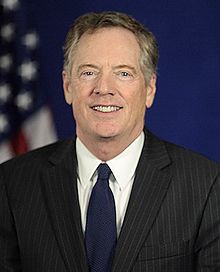Today, U.S. Trade Representative Robert Lighthizer formally notified Congress of its intent to renegotiate the North American Free Trade Agreement (NAFTA), via a letter to Congressional leadership. The letter is less detailed than last March’s draft notification, and unlike the March draft, it includes no specific negotiating objectives. Rather, the letter that was sent today notes “our aim is that NAFTA be modernized to include new provisions to address intellectual property rights, regulatory practices, state-owned enterprises, services, customs, procedures, sanitary and phytosanitary measures, labor, environment, and small and medium enterprises.” The letter also says that the Administration will develop negotiating positions that are consistent with the objectives found in Section 102 of the Trade Priorities and Accountability Act.
The administration wants to begin negotiations as soon as possible, but under the law must consult with Congress for a 90 day period, which begins now.
Click here for the full text of the notification letter.
See also: Inside U.S. Trade. “USTR notifies Congress of its intent to renegotiate NAFTA; U.S. hopes for a trilateral deal.” Link.
The negotiating objectives pertaining to intellectual property rights found in Sec. 102(b)(5) of the Trade Priorities and Accountability Act are pasted below:
(b) PRINCIPAL TRADE NEGOTIATING OBJECTIVES.—
… (5) INTELLECTUAL PROPERTY
—The principal negotiating objectives of the United States regarding trade-related intellectual property are—
(A) to further promote adequate and effective protection of intellectual property rights, including through—
(i)(I) ensuring accelerated and full implementation of the Agreement on Trade-Related Aspects of Intellectual Property Rights referred to in section 101(d)(15) of the Uruguay Round Agreements Act (19 U.S.C. 3511(d)(15)), particularly with respect to meeting enforcement obligations under that agreement; and
(II) ensuring that the provisions of any trade agreement governing intellectual property rights that is entered into by the United States reflect a standard of protection similar to that found in United States law;
(ii) providing strong protection for new and emerging technologies and new methods of transmitting and distributing products embodying intellectual
property, including in a manner that facilitates legitimate digital trade;
(iii) preventing or eliminating discrimination with respect to matters affecting the availability, acquisition, scope, maintenance, use, and enforcement of intellectual property rights;
(iv) ensuring that standards of protection and enforcement keep pace with technological developments, and in particular ensuring that rightholders have the legal and technological means to control the
use of their works through the Internet and other global communication media, and to prevent the unauthorized use of their works;
(v) providing strong enforcement of intellectual property rights, including through accessible, expeditious, and effective civil, administrative, and criminal enforcement mechanisms; and
(vi) preventing or eliminating government involvement in the violation of intellectual property rights, including cyber theft and piracy;
(B) to secure fair, equitable, and nondiscriminatory market access opportunities for United States persons that rely upon intellectual property protection; and
(C) to respect the Declaration on the TRIPS Agreement and Public Health, adopted by the World Trade Organization at the Fourth Ministerial Conference at Doha, Qatar on November 14, 2001, and to ensure that trade agreements foster innovation and promote access to medicines.





